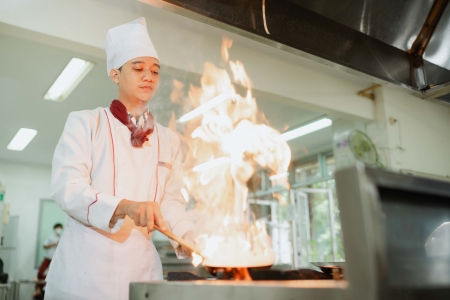Get to Know Closer the D4 Study Program in Food Service Industry Management and Nutrition, IPB University Vocational School

The food and beverage industry is one of the priority sectors in the implementation of industry 4.0, including the food service industry. This is also supported by the accelerated development of the tourism sector which supports the local food and beverage industry.
The high rate of development of the food and beverage service industry goes hand in hand with the high need for professional labor in this field. This condition will be answered by the existence of the Management of Food Service Industry and Nutrition (MIJMG) Study Program, Vocational School of IPB University which has been accredited by the National Accreditation Board of Higher Education (BAN-PT) D3.
“The mandate of this study program is to organize education and research in the field of food service industry management and nutrition as well as integrated community service,” said the Head of MIJMG Study Program, Dr Rina Martini.
Dr Rina said that the advantages of the MIJMG Study Program are implementing dual system learning and Freedom of Learning-Independence Campus (MBKM). The MBKM program allows students to have learning experiences on campus and in the food service industry. Thus, students have the skills to complete work in the food service industry effectively and efficiently.
“In addition to skills in food service industry management, graduates are also equipped with nutritional science so that they are able to produce food by considering nutritional and health aspects,” she said.
Lecture and learning activities in the MIJMG Study Program are supported by adequate facilities. This study program has two special laboratories that are used as processing laboratories. That were the culinary laboratory at the Cilibende Campus and the diet laboratory at the Gunung Gede Campus, Bogor City. The culinary laboratory is used for the basic competency courses of the study program, while the diet laboratory is related to the competency courses of the study program for advanced students.
In addition, there is also a Food Service Business Practice Laboratory (PUJB) located at the Gunung Gede campus, Bogor City. This laboratory is used for teaching cafeteria activities with the business name Kantin Sehati.
“The equipment in the MIJMG Study Program laboratory is in accordance with the competencies expected by graduates. The number of practicum equipment can meet the number of students. The use of laboratories for practicum in the culinary laboratory can be up to 24 hours per week, in the diet laboratory up to 20 hours per week and in the PUJB laboratory up to 42 hours per week,” said Dr Rina.
Furthermore, Dr Rina explained, lecturers who teach courses in the MIJMG applied undergraduate program consist of Civil Servant lecturers (PNS), non-civil servant permanent lecturers and permanent lecturers of IPB University Vocational School. The practitioner lecturers involved in teaching courses in the MIJMG Study Program are lecturers who come from the World of Industry and the World of Work (Iduka) partners in accordance with their competence.
“These practitioner lecturers will act as a teaching team or as field supervisors in the field work practice (PKL) of students in hospitals, hotels or other food service industries,” she said.
Dr Rina also stated that several lecturers in the MIJMG Study Program were involved as teachers in Pre-Employment training activities in collaboration with sekolah.mu (PT Sekolah Integrasi Digital) in the fields of bakery and patisserie and healthy food processing. In addition, lecturers are also active in research and community service activities related to food processing products or innovations. The results of this research and service have been registered to Intellectual Property Rights (Haki) and published in scientific journals.
“There is also an innovative baby menu planning application for 6-24 months old produced by MIJMG Study Program lecturers. The purpose of making this application called Baby Meal Planner is to prevent stunting. Apart from innovating, MIJMG lecturers also often become resource persons in national and international webinars,” she added.
Dr Rina said that many MIJMG students have received national achievements in the culinary field. Some students also participated in internship activities abroad such as Japan, which the study program has facilitated since four years ago.
In addition to a diploma, MIJMG graduates will receive a certificate of competence from the Vocational School Professional Certification Institute. Later graduates of this study program can work in the management of the food service industry, starting from planning and procuring food ingredients, processing and serving, based on culinary, nutritional and health aspects. In addition, they can also become food stylists, bakery experts, and food and beverage product testers. (MHT/Rz) (IAAS/RUM)



